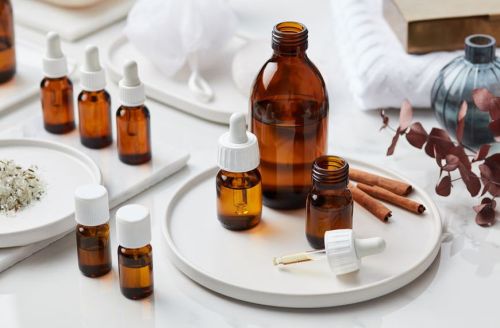This essential oil can take on superbugs (and it’s probably already in your pantry)
According to a new study, cinnamon essential oil could be a lifesaver in fighting superbugs. Here's what you should know about its bacteria-ridding abilities—and exactly how to use it safely in your own daily routine.

Over time, superbugs have gotten stronger. The antibiotics that used to work against the hard-to-treat bacteria are often no longer effective, and scientists are working around the clock to find better ways to kill them off for good. That includes one Australian researcher—and total #girlboss—who’s incredibly close: She discovered the solution might not be to rid the world of the infection-causing bacteria but to change its behavior—using an essential oil you could already have in your go-to collection.
For the study published in Microbiology, Sanjida Halim Topa, PhD, tested different concentrations of cinnamaldehyde—the component of cinnamon that gives it its flavor—on biofilms of the disease-causing bacteria Pseudomonas aeruginosa that’s responsible for everything from skin rashes and ear infections to pneumonia and blood infections. The compound worked wonders for stopping the development of the bacteria in its tracks, disrupting its formation by nearly 76 percent.
“Humans have a long history of using natural products to treat infections, and there’s a renewed focus on such antimicrobial compounds. Natural products may offer a promising solution to this problem.” —lead study author Dr. Sanjida Halim Topa
Biofilm—AKA the sticky group of bacterial microorganisms that bond themselves to surfaces—is notoriously hard to treat with antibiotics and causes infections wherever it calls home. And considering Pseudomonas aeruginosa was ranked by the World Health Organization as one of the top three most dangerous superbugs, finding its kryponite is in top order. It helps, of course, that it isn’t a fancy-schmancy new treatment, but one that’s been around since ancient times. “Though many previous studies have reported antimicrobial activity of cinnamon essential oil, it is not widely used in the pharmaceutical industry,” Dr. Topa says. “Humans have a long history of using natural products to treat infections, and there’s a renewed focus on such antimicrobial compounds. Natural products may offer a promising solution to this problem.”
Though cinnamon essential oil offers some serious natural defense against superbugs, its potency means you should use it with extreme care, according to Amy Galper, certified aromatherapist and educator at the New York Institute of Aromatic Studies. For starters, never touch the oil on its own, because it can cause skin irritation and even blisters. Galper only uses a very tiny percentage, “like only one drop in one ounce of a carrier oil” when she does mix it.
Since it’s so potent, the oil should also never be ingested on its own or even when diluted in water because it can burn the lining of your throat and gut—yeah, it’s that powerful. Make sure that if you want to ingest cinnamon for its health properties—the spice version, not the essential oil version!—you do so through tinctures and teas so that your body can take it in safely.
As you might guess, cinnamon essential oil is not so great to diffuse on its own due to its potency. Instead, Galper suggests blending it with “quenching oils like patchouli, lavender, geranium, and ylang ylang” (and PSA: you might not want to leave it puffing all day). Alternatively, you can create a disinfectant spray with two drops of the EO in a two-ounce spray bottle filled with water to combat airborne bacteria (and again, spray it sparingly). When used correctly, it could seriously boost your well-being. It is a superbug fighter, after all.
Try this 1-minute hack to kill bacteria on your kitchen sponge. Or, find out how you might be storing your toothbrush wrong—and therefore inviting bacteria into your mouth.










